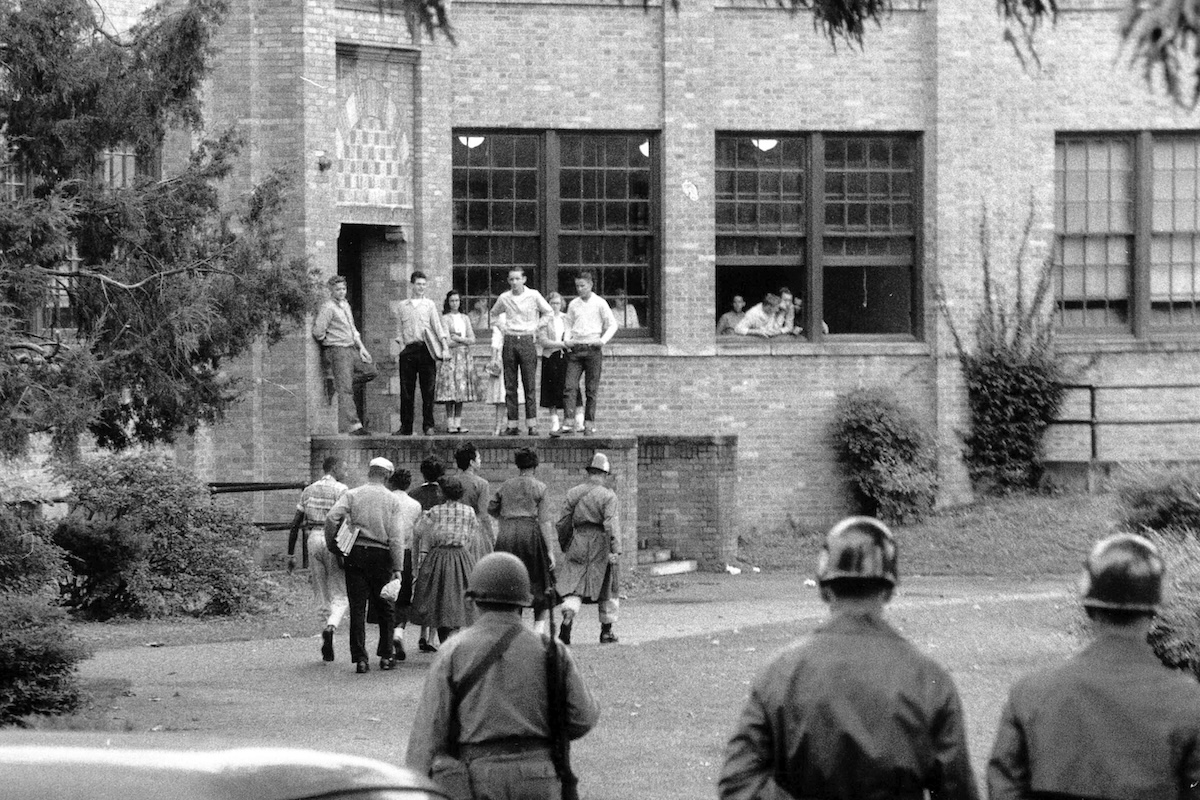Trump is wrong to say the act gives him unquestioned power, legal experts said. Due process rights under the constitution remain in place and courts can rule on the invocation’s legality even if they’ve been historically deferential to a president’s use of the law. His statement also ignores critical context about the conditions under which the act has previously been invoked.
The act “has been used very rarely and almost exclusively in circumstances where there would be popular acknowledgement that there is an ongoing rebellion or some kind of ongoing civil conflict that is of a pretty profound nature,” Bernadette Meyler, Stanford University law professor, said.
Protests against immigration enforcement and crime aren’t “the kind of trigger that ever has been used for invoking the Insurrection Act,” she said.
The White House did not respond to PolitiFact’s request for comment.
When has the Act been invoked and for what purposes?
Most of the Insurrection Act’s invocations took place more than 100 years ago.
Former President Ulysses S. Grant invoked the law six times in the 1870s — the most of any president — as white supremacist groups violently revolted after the Civil War. (Trump has said one president used the law “28 times,”[7] without naming him. That’s inaccurate.)
From 1962 to 1963, former President John F. Kennedy used the Insurrection Act three times to combat local governments that were forcibly opposing school desegregation following the Supreme Court’s Brown v. Board of Education decision.

In this Oct. 15, 1957, file photo, seven of nine black students walk onto the campus of Central High School in Little Rock, Ark., with a National Guard officer as an escort as other troops watch. (AP)
These cases represent a “defiance of federal law by state governments,” Tung Yin, professor of law at Lewis & Clark Law School, told PolitiFact.
“It’s not Portland police out there that are obstructing ICE or Oregon troops being deployed by Oregon Gov. (Tina) Kotek to interfere with ICE,” Yin said. “So I think that just makes the context look different.”
The most recent invocation came in 1992, when then-California Gov. Pete Wilson requested military support from President George H.W. Bush after riots[8] broke out following the acquittal of four white police officers in the beating of Black motorist Rodney King.
This is an example of a case “where local and state officials are completely and totally overwhelmed by the scale and scope of violence,” Christopher Mirasola, University of Houston Law Center assistant professor, said.
This level of mayhem is not in cities Trump has targeted for National Guard deployment, such as Portland and Chicago, where private citizens are protesting against U.S. Immigration and Customs Enforcement.

Two National guardsmen stand guard outside a burning donut shop at Martin Luther King Boulevard and Vermont Avenue in Los Angeles April 30, 1992. The National Guard was called in to aid police during the second day of rioting in the city. (AP)
Insurrection Act doesn’t give Trump ‘unquestioned power’
Trump also has made inaccurate claims about the scope of his authority when the Insurrection Act is in effect.
It doesn’t give the president “unquestioned power,” as Trump said.
“Presidents do not have unquestioned authority. They have limited authority that is available to them in very extraordinary circumstances, when there’s an insurrection,” Chris Edelson, an American University assistant professor of government, said.
Even during the Insurrection Act, people’s constitutional due process rights are protected, Mirasola said. Due process generally refers[9] to the government’s requirement to follow fair procedures and laws.
Trump also exaggerated Oct. 19 when he told reporters[10] there are “no more court cases” when the act is invoked. Courts can rule on whether the use of the Insurrection Act is legal, Meyler said. However, the act is broadly written and doesn’t define terms such as “insurrection” or “rebellion.” The U.S. Supreme Court ruled[11] in 1827 that the president has exclusive power to decide whether a situation represents an acceptable reason to invoke the law.
Our ruling
Trump said, “Fifty percent of the presidents, almost, have used” the Insurrection Act, “and that’s unquestioned power.”
The act has been used by 17, or 37%, of U.S. presidents. Most of those 30 invocations took place more than 100 years ago, so it’s not as frequent as Trump made it seem.
Legal experts said Trump’s focus on the numbers omits context about his proposed use of the act to stop protesting and crime. The act has been invoked to stop rebellions, white supremacist revolts and force state governments to follow federal laws regarding desegregation. The last president to use the act, Bush in 1992, did so in California at the request of the governor after riots broke out in Los Angeles.
He’s also wrong to say the law gives him “unquestioned power.” Due process rights under the constitution remain in place and courts can rule on the invocation’s legality, even if they’ve been historically deferential to a president’s use of the act.
His statement ignores critical facts that would give a different impression. We rate the statement Mostly False.
References
- ^ interview (x.com)
- ^ courts (www.cnn.com)
- ^ rule (www.cnn.com)
- ^ rarely used statute (www.npr.org)
- ^ set of laws (www.politifact.com)
- ^ occasions (www.brennancenter.org)
- ^ used the law “28 times,” (rollcall.com)
- ^ riots (www.npr.org)
- ^ refers (www.law.cornell.edu)
- ^ when he told reporters (rollcall.com)
- ^ ruled (supreme.justia.com)
